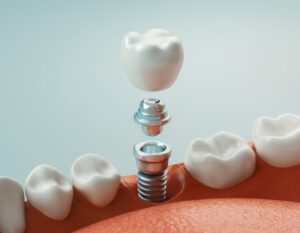
Dental implants are one of the most reliable ways to replace missing teeth, restoring both function and aesthetics. For decades, titanium has been the gold standard material for implants. However, in recent years, zirconia implants have emerged as an alternative, appealing to patients seeking a metal-free option. If you’re considering dental implants, understanding the differences between titanium and zirconia can help you make the right choice for your smile.
Titanium Dental Implants
Titanium has been used in dentistry since the 1960s, and its success rate is well-documented. This lightweight, durable metal fuses naturally with the jawbone in a process called osseointegration, creating a stable foundation for crowns, bridges, or dentures.
Advantages of Titanium Implants
- Proven track record: Titanium implants boast success rates above 95 percent, with decades of clinical research supporting their use.
- Durability: Titanium is strong yet flexible, able to withstand chewing forces over many years.
- Two-piece design: Most titanium implants are designed with a separate post and abutment, allowing for easier adjustments and more versatile treatment options.
Potential Drawbacks
- Metal sensitivity: Though rare, some patients may have allergic reactions or sensitivities to metal.
- Aesthetics: In cases of gum recession, the gray color of titanium may show through the gums, affecting appearance.
Zirconia Dental Implants
Zirconia implants, sometimes called “ceramic implants,” are made from zirconium dioxide, a biocompatible ceramic material. Introduced more recently than titanium, zirconia implants appeal to patients who prefer a metal-free restoration.
Advantages of Zirconia Implants
- Aesthetics: Zirconia’s tooth-colored material blends seamlessly with natural teeth, making it ideal for patients with thin or receding gums.
- Biocompatibility: Zirconia is hypoallergenic and non-metallic, reducing the risk of sensitivity or inflammatory reactions.
- Resistance to plaque buildup: Zirconia’s smooth surface may help minimize plaque accumulation, supporting gum health.
Potential Drawbacks
- Less long-term research: While zirconia implants show promising results, they do not have the decades of clinical data that titanium does.
- One-piece design: Most zirconia implants are one-piece, which can make placement less flexible compared to titanium’s two-piece systems.
- Fragility: Although strong, zirconia is more brittle than titanium and may be more prone to fracture under extreme pressure.
Which One Should You Choose?
The choice between titanium and zirconia implants depends on your personal needs and preferences. Titanium is often recommended for its durability, flexibility, and proven success. Zirconia may be a better choice if you have metal sensitivities, want a completely metal-free option, or are especially concerned about gum aesthetics.
Both titanium and zirconia implants can provide lasting, natural-looking tooth replacements. Your dentist will evaluate your oral health, aesthetic goals, and overall medical history to recommend the material that best suits you. With either option, you can look forward to improved function, confidence, and a healthier smile.
About the Author
Dr. Lewis has more than 15 years’ experience working in the dental field. She is a graduate of the Howard University College of Dentistry, where she received the Community Dentistry Award and the Academy of Esthetic Dentistry Award. Dr. Lewis is also certified in Invisalign and laser dentistry and is a proud member of the American Academy of Esthetic Dentistry. With this level of experience and expertise, you can trust Dr. Lewis and our team to provide you with excellent treatment when it comes to dental implants. Schedule an appointment online or call our Allen office at (972) 954-9728.
